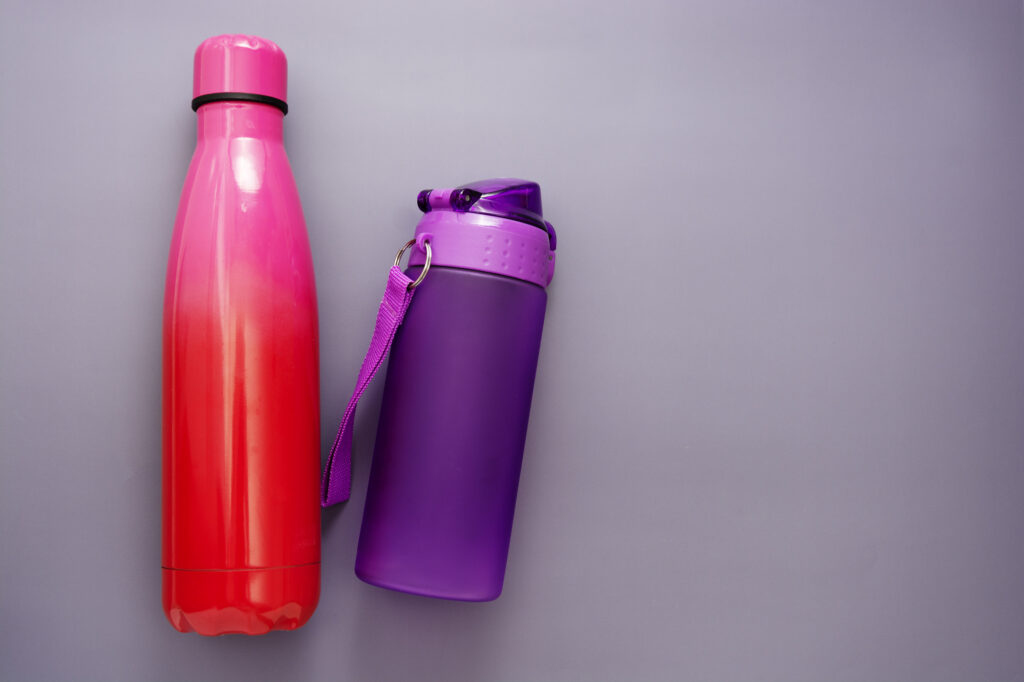What is the healthiest material for a water bottle?

What is the most healthy material for a water bottle
In fact, out of all materials, stainless steel bottles are regarded as the safest and healthiest water bottles.
Are stainless steel water bottles better than plastic
Better for your health
The best alternative to plastic bottles is a food-grade stainless steel water bottle because it doesn't contain the harmful chemicals that plastic does and it won't leach chemicals, even if you fill it with hot beverages.
Are metal water bottles healthier
The majority of plastic and glass water bottles contain harmful chemicals. At worst, these chemicals can lead to numerous health problems, including cancer, diabetes, heart diseases, and more. Fortunately, metal water bottles don't contain any harmful substances.
Are stainless steel water bottles safe for health
The safest type of reusable water bottle to drink from is a high-quality stainless steel water bottle. In comparison, reusable stainless steel water bottles are better than plastic or aluminium. Stainless steel is a non-toxic material that doesn't need a liner.
What’s the safest plastic for a water bottle
LDPE (Low Density Polyethylene): It is a type of plastic that does not release any chemicals into the water, one of the safest that exists, so there is no danger in its reuse. PP (Polypropylene): Like the containers marked with HDPE, they are for reuse.
Is BPA-free plastic safe
Are BPA-free products fully safe According to Care.com, just because a product is labeled as BPA-free doesn't mean it's fully safe to use. In fact, 70 percent of all BPA-free products still leach harmful chemicals into food and beverages.
What is the best metal for a water bottle
stainless steel water bottles
What is the best material for a water bottle While it is up to you, we prefer stainless steel water bottles because they are better at keeping water cool—if you like your water iced, they are more likely to keep it insulated and chilled than other materials.
Is it better to drink water out of glass or stainless steel
TL;DR: Glass is a no brainer—it tastes better by a mile, it won't drop once and dent or scratch to the point of ugly, it's far nicer to the environment than any metal bottle, it's dishwasher safe, and it won't leach toxic chemicals or heavy metals into your water.
Is stainless steel Safer Than plastic
While a lot of people opt for plastic water bottles because they are lightweight and cheap, they are not the most environmentally friendly option. For this reason, a stainless steel water bottle is a better choice because it is not harmful to the environment. Steel bottles are also safer to drink from.
What type of water bottle is safest
Glass is the safest water bottle type and offers the purity of taste, but stainless steel offers insulation benefits that keep your beverages hot or cold. Check out Aquasana's full selection of glass and stainless steel water bottles to enjoy healthy, great-tasting water wherever you go.
Is it better to drink out of stainless steel
Stainless Steel Water Bottles are Safe
The plastics in recyclable plastic water bottles are thought to be a health risk. Harmful chemicals are emitted from these bottles, and these chemicals might cause cancer. By switching to stainless steel, you can prevent harmful carcinogens from leaching into your drinking water.
Which plastic is not harmful
Polypropylene is a plastic. Of the commercial plastics on the market today, polypropylene is considered one of the safest. It's FDA-approved for food contact, so you'll find polypropylene in food containers like those that hold yogurt, cream cheese, and butter products.
What plastic water bottles to avoid
Plastic bottles with recycling code “3” should also heed caution, as they may contain phthalates. Known as the “everywhere chemical,” phthalates are a group of man-made chemicals that help make plastics more flexible and more difficult to break, and have been shown to leach into bottled water over time.
Is BPA free actually better
According to Care.com, just because a product is labeled as BPA-free doesn't mean it's fully safe to use. In fact, 70 percent of all BPA-free products still leach harmful chemicals into food and beverages.
Is BPA free better than BPA
This suggests that EDCs are having much broader effects on health and disease than just mimicking estrogens (which is bad enough).” “'BPA free' does not necessarily mean safer,” she continues. “It's been marketed in that way. But when you look at the structure of BPA and BPS, there is very little difference.
Is glass water safer than plastic
Glass is the safest reusable water bottle material because it's chemical-free, made from natural materials, and dishwasher safe. Glass water bottles don't leach harmful chemicals into your water and are another way to reduce or avoid microplastics.
Is stainless steel better than BPA-free
While that's somewhat better, research shows that BPA-free plastics may still contain a different chemical compound that is just as harmful. On the other hand, food-grade stainless steel has no harmful chemicals. There are no chemicals that will end up in the water eventually as well.
Which plastic is safe for drinking water
Plastics that have the identification numbers 1,2,4 or 5 are what are considered safe as they are BPA-free. You can purchase any of our BPA-free water bottles right here.
What plastic is safe for health
When you do use plastics, look for these resin codes which are considered safer: #2 HDPE, #4 LDPE, and #5 PP. Examples of #2 HDPE (high density polyethylene) include: bottled milk, water and juice, yogurt cups, and some plastic bags.
Is BPA free still toxic
According to Care.com, just because a product is labeled as BPA-free doesn't mean it's fully safe to use. In fact, 70 percent of all BPA-free products still leach harmful chemicals into food and beverages.



0 Comments